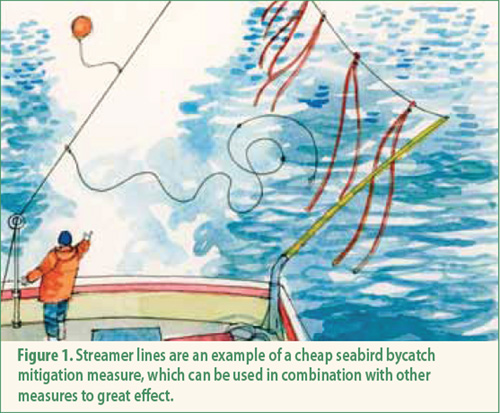Eric Gilman (College of Natural and Computational Sciences, Hawaii Pacific University) and colleagues have produced a report on behalf of the World Conservation Union (IUCN) that assesses in detail how well 13 Regional Fisheries Management Organizations (RFMOs) are managing the resources and environments for which they are responsible. All the tuna RFMOs, as well as CCAMLR (Commission for the Conservation of Antarctic Marine Living Resources) and the General Fisheries Commission for the Mediterranean (GFCM) that manage fisheries that interact with ACAP-listed albatrosses, petrels and shearwaters are considered.
The report's long Executive Summary commences:
"Effective governance of bycatch, including discards, in marine capture fisheries is necessary to avoid adverse ecological and socioeconomic consequences. Marine regional fisheries management organizations (RFMOs) have achieved mixed progress in governing bycatch. There are large gaps in binding measures to control direct and broader indirect adverse consequences of bycatch. A lack of explicit performance standards, in combination with inadequate observer coverage and incomplete data collection, hinders assessing control measures' efficacy. Measures are piecemeal in not considering potential conflicts as well as mutual benefits resulting from their implementation. Through regional observer programs, RFMOs are collecting only half of the minimum information needed to understand and govern ecological effects of bycatch and assess the efficacy of bycatch measures. RFMOs are not collecting data to estimate and account for all sources of bycatch losses, including from sources of unobservable fishing mortality. Observer coverage rates are inadequate in a large majority of RFMO-managed fisheries, and international exchange of observers to maximize data accuracy occurs in a small minority of programs. There is no open access to research-grade primary or amalgamated datasets from RFMO regional observer programs. Ecological risk assessments conducted by RFMOs have focused on assessing effects of fisheries on species groups relatively vulnerable to overexploitation, including bycatch of seabirds, sea turtles, marine mammals and elasmobranchs, and effects of demersal fishing on vulnerable benthic marine ecosystems. Assessments have largely not evaluated broader, more complex and indirect effects of bycatch across facets of biodiversity. There are limited resources for surveillance, and thus compliance is likely low. A lack of transparency and limited and inconsistent reporting of inspection effort, identified infractions, enforcement actions and outcomes further limits the ability to assess the efficacy of bycatch measures in meeting explicit or otherwise implicit objectives. Augmented coordination by RFMOs, including providing for interoperability of observer bycatch datasets across regions, avoiding incompatibilities in bycatch management measures, networking protected sites, and combining resources for research, monitoring, surveillance and enforcement, might address individual RFMO's deficits in governing bycatch."

Reference:
Gilman, E., Passfield, K. & Nakamura, K. 2012. Performance Assessment of Bycatch and Discards Governance by Regional Fisheries Management Organizations. Gland: International Union for Conservation of Nature). ix + 484 pp.
John Cooper, ACAP Information Officer, 9 July 2012

 English
English  Français
Français  Español
Español